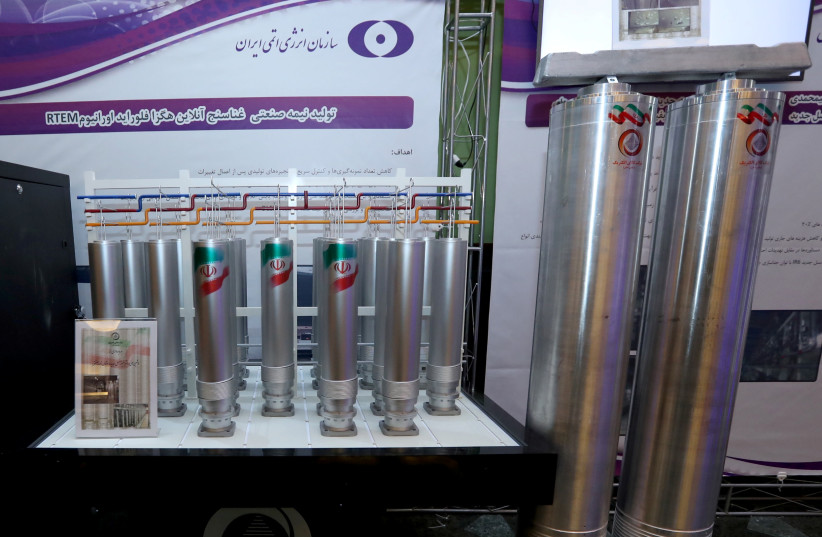IDF Chief Halevi: Iran nuke advances could lead to us needing to attack
IDF chief-of-staff Lt. Gen. Herzi Halevi on Tuesday said that Iran’s continued nuclear advances could lead Israel to having no choice but to attack.
The IDF chief said, “Iran has progressed in recent years with enriching uranium more than ever before. We are looking closely at the various arenas which are part of the path to nuclear capabilities. There are negative potential trends on the horizon which could lead to acting – – we have the capabilities.”
Next, he said Iran is involved in “everything around us and with everyone who is against us,” including strategy, intelligence and funding.
But he said, “We have the capability to strike Iran. We are not aloof to what Iran is trying to do around us. Iran also cannot be aloof to what we can do against it.”
Honing in on the many threats Israel faces, he said that if the IDF finds itself in a multifront war, it will strike its enemies on all fronts much harder.
 A number of new generation Iranian centrifuges are seen on display during Iran’s National Nuclear Energy Day in Tehran, Iran April 10, 2021 (credit: IRANIAN PRESIDENCY OFFICE/WANA (WEST ASIA NEWS AGENCY)/HANDOUT VIA REUTERS)
A number of new generation Iranian centrifuges are seen on display during Iran’s National Nuclear Energy Day in Tehran, Iran April 10, 2021 (credit: IRANIAN PRESIDENCY OFFICE/WANA (WEST ASIA NEWS AGENCY)/HANDOUT VIA REUTERS)He explained that this would be necessary in order to cope with the higher complexity of fighting on multiple fronts.
Regarding normalization, he said he did not view the recent deal between Iran and Saudi Arabia as a strategic change that would set back Israeli goals.
Halevi said that some “states [Saudi Arabia] have come closer to Iran. I don’t think these states trust Iran or want true peace [with it]. This [the new Saudi deal] comes from wanting to reduce the temperature a bit within the region. To avoid a bigger confrontation.”
Halevi calls on haredim to draft to the IDF
Addressing issues of the IDF and Israeli society internally, Halevi called on the Haredi community and its leaders to make a greater effort to send more Haredim to the army.
He said that Haredim who have joined the army return to their communities “no less Haredi”, but more able to contribute to their communities and the country.
Transitioning to other army and society issues, he said that IDF reservists in the recent period have shown up in very high numbers, dispelling fears that fights over the judicial overhaul issue would break the army apart.
Halevi said that the IDF must be kept out of politics at all costs.
In addition, he said that the IDF must continue the mandatory draft in order to continue to remain strong and safe in the dangerous region that is the Middle East.
In fact, he said that other countries which may have recently dropped their mandatory draft were in much safer and lower-risk regions.
The threat posed by Hezbollah
Moving on to the threat posed by Hezbollah in Lebanon, he said that Israel wants to avoid war, but should also always be ready to consider military moves “which can yield advantages,” in the ongoing standoff.
He said that “relative deterrence of Hezbollah [from attacking Israel] has been achieved, but this does not mean forever.”
On one hand, he stated, “Hezbollah is very deterred from fighting a big war versus Israel.”
On the other hand, he noted that Hezbollah “thinks it understands how we think which can lead it to dare and challenge us in scenarios where we won’t go to war” in response.
Halevi said all of this means that Israel must “take action to carry out surprises when needed,” to make Hezbollah feel less secure about being daring against Israel.
Further, he pointed out that, “we have a very good level of readiness in the North for any war. It gets better every day.”
Although any fight with Hezbollah would be very difficult for the IDF and the Israeli home front, he said, “it would be very hard for Lebanon to recover after such a war.”
Turning his attention to Syria, he warned Syrian leader Bashar Assad that, “any state which got closer to Iran is failing and falling apart. He should take this into account.”
Moreover, he noted that “in recent weeks, Assad came for the first time in 12 years to an Arab League meeting. He is starting hesitatingly to return to the region,” leaving open the question of whether moderate Sunni states may draw Syria away from the dangerous Iranian Shiite axis.





Comments are closed.